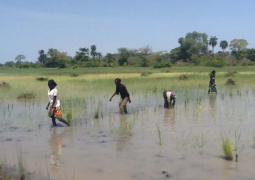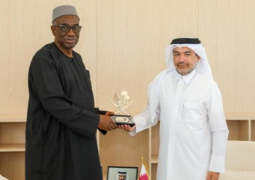
However, Mr. Ceesay said despite continuous policy declarations and documents and the grassroots effort to encourage inclusive representation of youth and women in decision making, there remain structural barriers that prevent women and youth from contributing to security and peace building on national, regional, and local levels.
He highlighted that the earlier we acknowledge and address it, the better for our progress.
Ceesay made these remarks on Tuesday at Mansakonko during a community dialogue initiative among women, youth and community leaders/structures in Lower River Region.
The dialogues held in Lower River, Central River and Upper River Regions was funded by UNICEF through the United Nations Peace Building Fund.
The dialogues centered on the roles of women and youth participation in governance and peace building.
About 240 participants (women, young people & community leaders) across the selected regions benefitted from the training.
The theme for the dialogues was ‘Women and Youth Involvement in Governance and Peace Building, December Polls Focus’.
The activity followed similar engagements that the NCCE recently rolled out; the training of out of school youths on leadership, civic rights and duties to prepare them for transition to adulthood and citizenship including school and public good management, to nurture patriotism and responsible citizenship among young people.
“Without actively consulting and listening to youths’ and women’s views, ideas and needs, national policy-making processes become one-sided and fail to serve greatest good of all especially young people to preserve long-lasting peace in the country,” he posited, saying therefore, for sustainable peace building or conflict and crisis response, as a country on a transition, it is absolutely critical to invest more in the meaningful inclusion of youth and women at all stages from Participation to Prevention, Protection to Resolution and Recovery.
He further said that, over the years there has been major progress of putting young people and women in critical positions, but was quick to add that the progress is uneven.
“Women and young people are still underrepresented in politics, in our National Assembly and in our traditional rule, while more youth and women are putting themselves forward for elections and more are mounting key positions in different sectors, yet their numbers are still far behind,” he went on.
“There is still a prevailing traditional perception as to the role of women and young people in the social, economic and political spheres. Sadly, some of these barriers still exist despite the widely accepted belief that development, peace and prosperity in societies cannot be achieved if half of the Gambia’s population, which is women and young people continue to be largely side-lined in decision making,” he also said.
“The stigma against women especially in politics is still alive and well. They continue to face structural, socioeconomic, institutional and cultural barriers. Tackling those barriers takes effort on the part of every element of society whether it is government, civil society, the private sector, youth, women and even more importantly traditional rulers,” Ceesay said further.
SPO Ceesay said having women and youth in political leadership is very much in line with our constitution which guarantees the basic human right for women and men including young people to enjoy full legal equality of opportunity.
He also said that NCCE strongly believes that no meaningful development and sustainable peace and democratic maturity can be attained if the critical mass is left behind.



